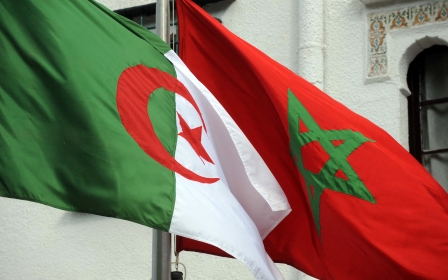Algeria severs diplomatic ties with Morocco over 'hostile manoeuvres'

Algeria announced on Tuesday that it was officially severing ties with neighbouring Morocco "starting today", after months of tensions between the two countries.
Algerian Foreign Minister Ramtane Lamamra made the announcement during a press conference on Tuesday evening.
"It has been proven that the (Moroccan) kingdom has not ceased its unfriendly, low and hostile manoeuvres against Algeria for a day since independence," Lamamra said, accusing Moroccan leaders of bearing "responsibility for the successive crises that have drawn us into a tunnel without an exit".
A few hours after the Algerian announcement, Morocco’s Foreign Ministry issued a statement “taking note of Algerian authorities’ unilateral decision”.
“Morocco regrets this completely unjustified but expected decision - in light of the escalation observed in recent weeks - as well as its impact on the Algerian people,” the statement read, adding that Rabat “completely rejects the fallacious, and even absurd, pretexts” behind the Algerian move.
Stay informed with MEE's newsletters
Sign up to get the latest alerts, insights and analysis, starting with Turkey Unpacked
'Algeria refuses a unilateral fait accompli'
- Ramtane Lamamra, Algerian foreign minister
The two countries have long been at odds over a host of issues, notably the fate of the Western Sahara. The border between Algeria and Morocco has been closed since 1994.
"One feels that as long as the Western Sahara issue isn't resolved, it will remain a factor of instability for the region," an Algerian analyst told Middle East Eye on condition of anonymity.
Morocco claims full sovereignty over the territory, while Algeria backs the Polisario Front's demands for a referendum on self-determination under the auspices of the United Nations.
Rabat's re-establishment of ties with Israel late last year - as part of then-US President Donald Trump's push for normalisation in the region - was accompanied by US recognition of Moroccan sovereignty over the Western Sahara, reigniting tensions with Algiers.
'They've hit where it hurts, multiple times'
Algeria has long been one of the most outspoken countries in North Africa in support of Palestinians, and news that Morocco had officialised diplomatic relations with Israel sparked anger from Algerian officials and citizens alike.
Lamamra referred to accusations lobbed earlier this month after Israeli Foreign Minister Yair Lapid said during a visit to Morocco that he and Moroccan Foreign Minister Nasser Bourita shared "worries about the role played by Algeria in the region". The Israeli foreign minister also said at the time the concerns were based on Algeria "getting close to Iran".
"Morocco has become a secondary base for the planification of a series of dangerous aggressions against Algeria," Lamamra said on Tuesday, accusing Bourita of being the "instigator" behind Lapid's comments.
"Algeria's response today highlights the urgent necessity of adhering to reason, instead of the terrible bet that seems to drive the kingdom of Morocco's posture towards Algeria," Lamamra added.
"Algeria refuses to endure reprehensible behaviour and acts... Algeria refuses a unilateral fait accompli with disastrous consequences for the peoples of the Maghreb."
In July, Algiers recalled its ambassador to Morocco after the Moroccan envoy to the United Nations called at a meeting of the Non-Aligned Movement for "the right of self-determination for the people living in the Kabylia region", in reference to Algeria's Tamazight-speaking minority, suggesting Algeria should not deny such a move while backing self-determination for Western Sahara.
Last week, Algeria's High Security Council, headed by President Abdelmadjid Tebboune, decided to "review" relations with Morocco in the wake of the Morrocan's comments on Kabylia.
"Moroccans have touched on the two biggest taboos of Algeria: national unity and the politics vis-a-vis Israel," a diplomatic source told MEE. "They've hit where it hurts, multiple times."
Matters deteriorated further in July after the consortium of journalists created by Forbidden Stories about Pegasus spyware sold by Israel’s NSO Group revealed that Rabat was “one of the biggest users of the spyware, to the detriment of the Algerian authorities”.
Algiers has also levied accusations against Rabat of being implicated in deadly fires that have ravaged northern Algeria in recent weeks.
But for Moroccan media like news website Le 360, “if the break decided by Algiers changes nothing in relations that were already de facto frozen, it however drags the Algerian regime on the path of escalation”.
“This is a new escape for the junta in power, which is trying by all means to mask its serious failures in the handling of several hot-button files: a catastrophic management of the health crisis, a vaccination campaign at a standstill, the incapacity of authorities to provide homes with drinking water, the glaring incompetence of the regime in facing forest fires…” Le 360 added.
- This article is based on a story originally published by Middle East Eye's French website.
Middle East Eye delivers independent and unrivalled coverage and analysis of the Middle East, North Africa and beyond. To learn more about republishing this content and the associated fees, please fill out this form. More about MEE can be found here.




